One day in July in the exercise yard at the Bristol County Jail and House of Correction in North Dartmouth, an inmate approached the sheriff with a few things on his mind. The sheriff asked him to put it all on paper, and he did: six handwritten pages on jailhouse suicide, virtual visiting, toothbrushes, nail clippers, privacy in showering, canteen prices, driving classes.
It was an earful, and just an opener. Chat me up again, wrote the inmate, who apparently had spent years behind bars in state and county institutions. “I think you’d want to hear my insights,” the inmate wrote. “If not, then I understand your (sic) a busy man!!”
Sheriff Paul Heroux, former state legislator and Attleboro mayor, has been busy since Jan. 4, 2023, when he stepped into the job that had been held by one man for 25 years. He’s been reforming the agency of some 500 employees, but also answering letters from inmates, while sometimes apologizing for taking months to do so.
He’s been gaining a reputation for seeking out different points of view from his staff, and also from inmates in his visits to the housing units, and in letters.
A public records request turned up 107 letters from inmates to Heroux from early January 2023 to early February 2024.
No letters immediately surfaced to Heroux’s predecessor, Thomas M. Hodgson, who also received inmates’ correspondence, according to his former spokesperson, Jonathan Darling. If Hodgson’s letters were kept, it was apparently not all in one place, as a member of Heroux’s legal crew said he could not find them.
Heroux said his inner state legislator feels compelled to write back to his “constituents,” who include some 600 to 700 people held in custody on an average day. Typically, more than half are in pre-trial detention, the rest serving sentences for offenses punishable by up to 2½ years.
They send complaints, thanks, suggestions. They write frequently about food, their tablet computers, visiting procedures, medical and mental health, and addiction treatment.
One inmate sent five letters totaling 62 pages — in handwriting ranging from tightly controlled to loose and looping — alleging that his entire family was murdered and billions of dollars stolen from a trust fund. Heroux said he could not figure a way to answer that. He said he responds to questions he can address, even if it’s by saying the issue falls outside the sheriff’s authority.
Under state law governing criminal records, the Sheriff’s Office struck inmates’ names out of the records. Otherwise, the letters offer a glimpse of life inside the House of Correction complex in North Dartmouth and the Ash Street Jail and Regional Lock-Up in New Bedford.
‘The girls all loved the chicken chow mein’
Writing in November from the Women’s Center in the North Dartmouth complex, an inmate said she didn’t want to sound like she was complaining about the food — but. Perhaps a few menu changes might be considered.
The body of her letter ran five paragraphs, mentioning fruit and condiments and bananas, and real sugar in the canteen. Then came a “P.S.” just about as long:
“Sorry, I keep thinking of more things,” she wrote. “Like salad or in the mornings I know there’s a budget but waffles or pancakes with maple syrup, or even the oatmeal with apples and cinnamon (spelling?) I don’t mean to complain or come off as ungrateful, but I know I took those things for granted, and I wish I didn’t, but I know I and the other inmates would love to have that added to our menu! A bigger variety of veggies and fruit, and coffee once a week or something…
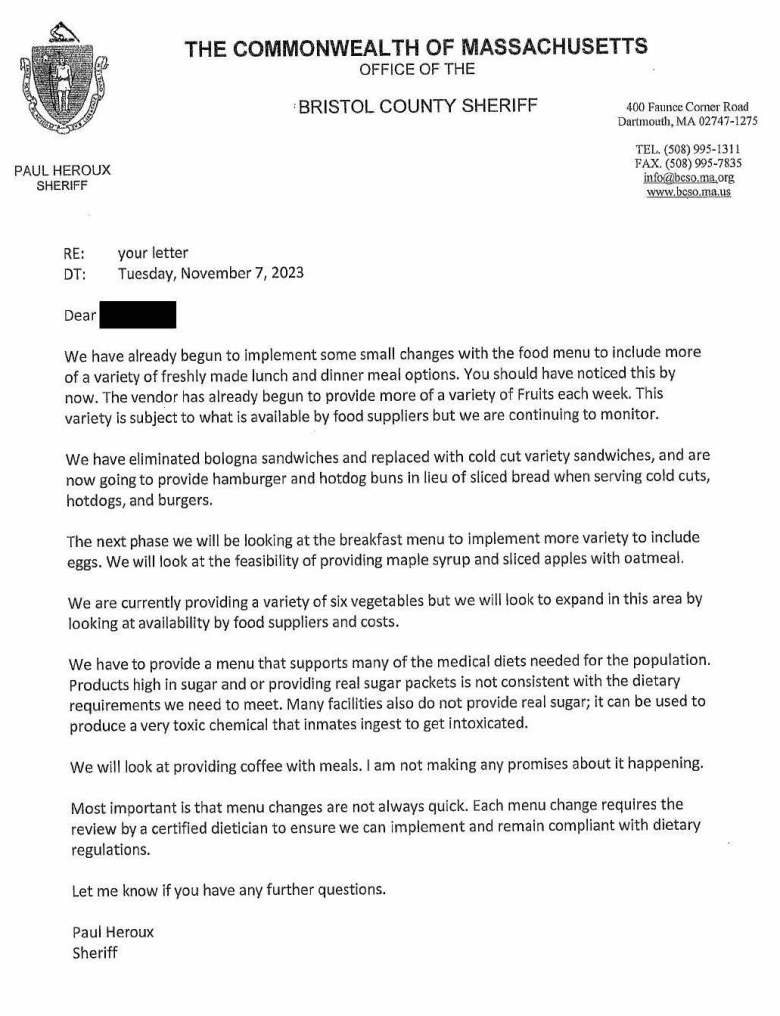


“Oh! Like the girls all loved the chicken chow mein or lo mein, whatever it is called, it is something different and good!”
Heroux answered a few days later, mentioning menu changes, including: “more of a variety of freshly made lunch and dinner meal options …The vendor has already begun to provide more of a variety of Fruits each week…”
Bologna sandwiches are out, replaced with cold cut varieties, he wrote. Products high in sugar are out, and so are sugar packets, which “can be used to produce a very toxic chemical that inmates ingest to get intoxicated.”
The administration was working on more breakfast variety, including eggs, maybe sliced apples with oatmeal, and, yes, possibly maple syrup. Coffee? Under consideration, the sheriff wrote. No promises.
He didn’t want to be handcuffed
The inmate writing on Dec. 18 had a word for conditions in North Dartmouth: “deplorable.”
The inmate was in a “special management unit” for prisoners whose time outside the cell is curtailed. He objected to how he was being disciplined for what he described as a “non violent, non aggressive issue” with a lieutenant.
He claimed officers were not following state procedural codes, and said he had filed several grievances. He said he was denied his right to a disciplinary hearing because he did not want to be handcuffed and leave his cell, and had yet to receive a disciplinary report. He said his tablet computer — granted to every inmate for limited access to the internet, books, movies, email, and making phone calls — had been switched off.
“Your facility is violating my rights,” he wrote.
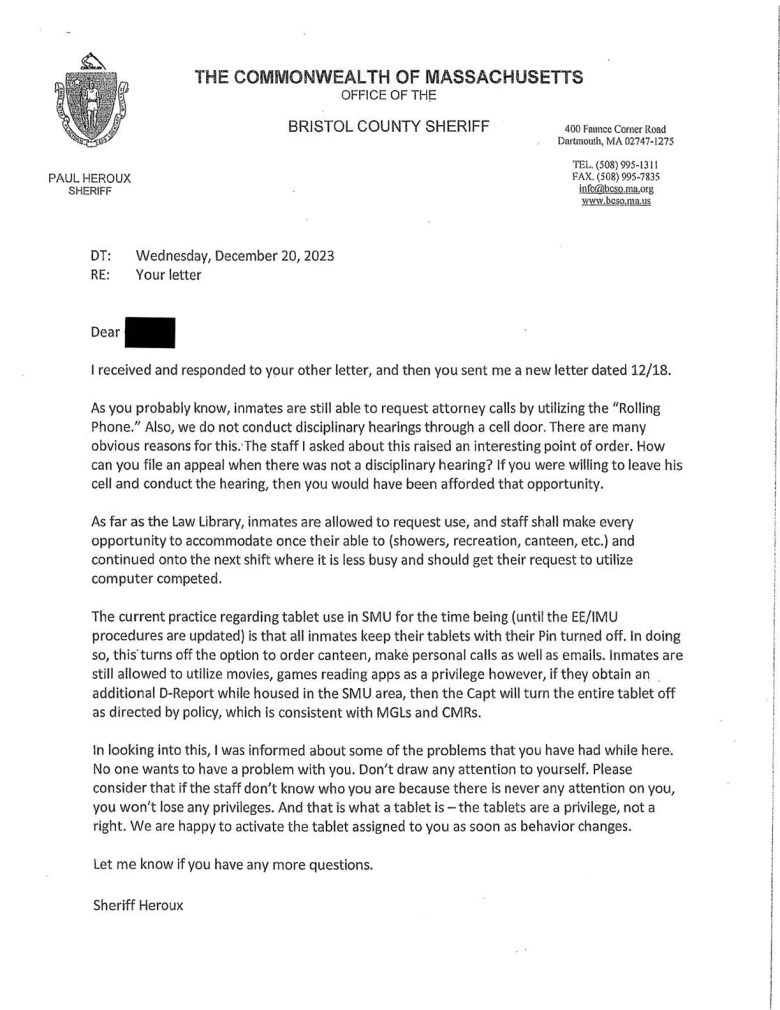
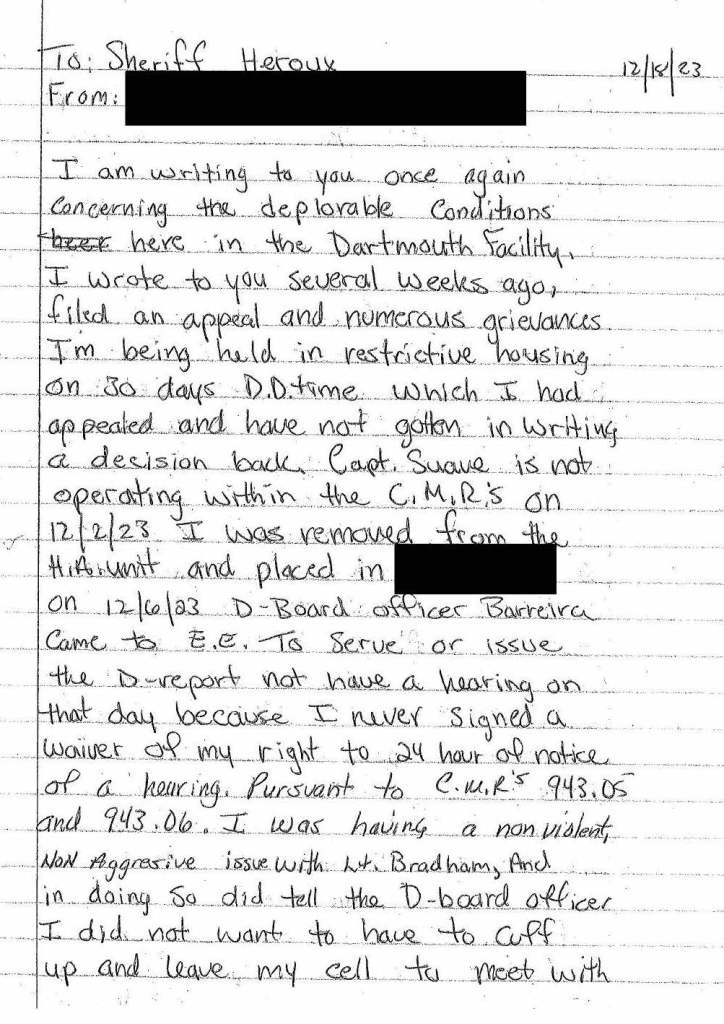
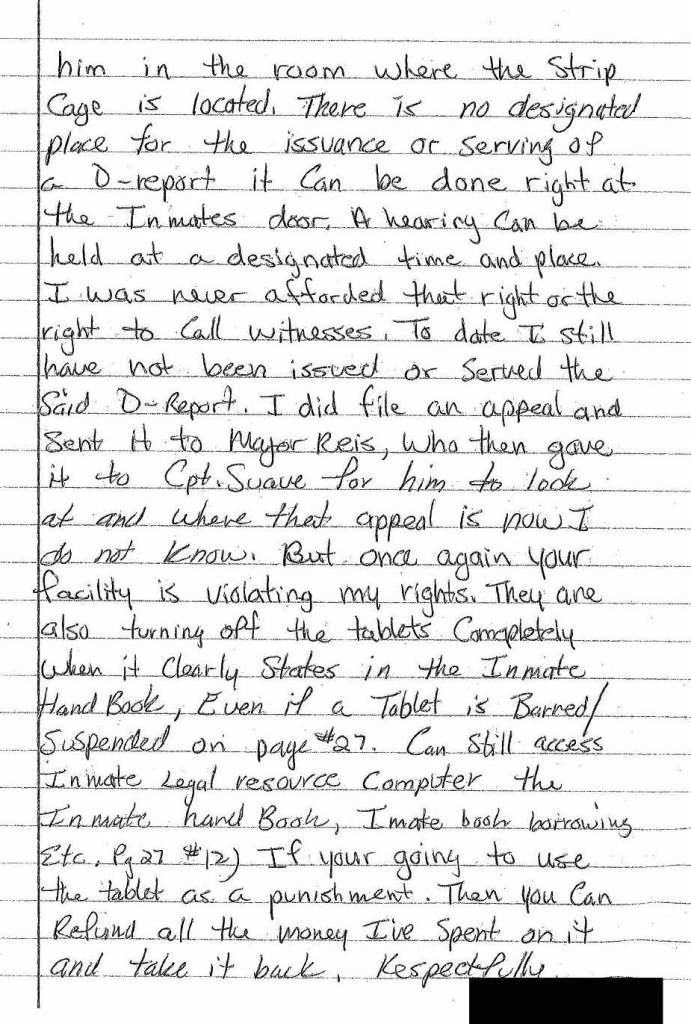
Two days later, Heroux responded. He said the inmate would have been granted a hearing if he’d been willing to leave his cell, and that hearings could not be conducted at the cell door, as the inmate suggested.
Heroux explained the rules about tablets in a “special management unit”: the device could be switched off entirely if the inmate received a disciplinary report while held there.
“The tablets are a privilege, not a right,” Heroux wrote. “We are happy to activate the tablet assigned to you as soon as behavior changes.”
Heroux also offered some advice on behavior: “I was informed about some of the problems you have had while here. No one wants to have a problem with you. Don’t draw any attention to yourself. Please consider that if the staff don’t know who you are because there is never any attention on you, you won’t lose any privileges.”
‘Can you allow this facility to have video visitation?’
Televisions are mounted on walls in several common areas in the North Dartmouth housing facilities, but there are none in the cells. Early in his tenure the former sheriff, Thomas Hodgson, had them removed, saying he thought inmates could make better use of their time.
One inmate writing in December thought otherwise. He asked about installing TVs and expanding access to tablet computers.
“Could you also consider increasing the tablet curfew by one hour instead of 9 pm we could enjoy the resources of the tablet until 10 pm or allow us 24 hour access to the tablets,” the inmate wrote. He was asking for a change from corrections staff’s practice of collecting all the tablets from inmates at night and plugging them into a multi-tablet charger.
And, he wondered, could the tablets offer a way to visit with people who live far away? “My family doesn’t live close by so I am unable to get visits. Can you allow this facility to have video visitation so I can see my loved ones.”
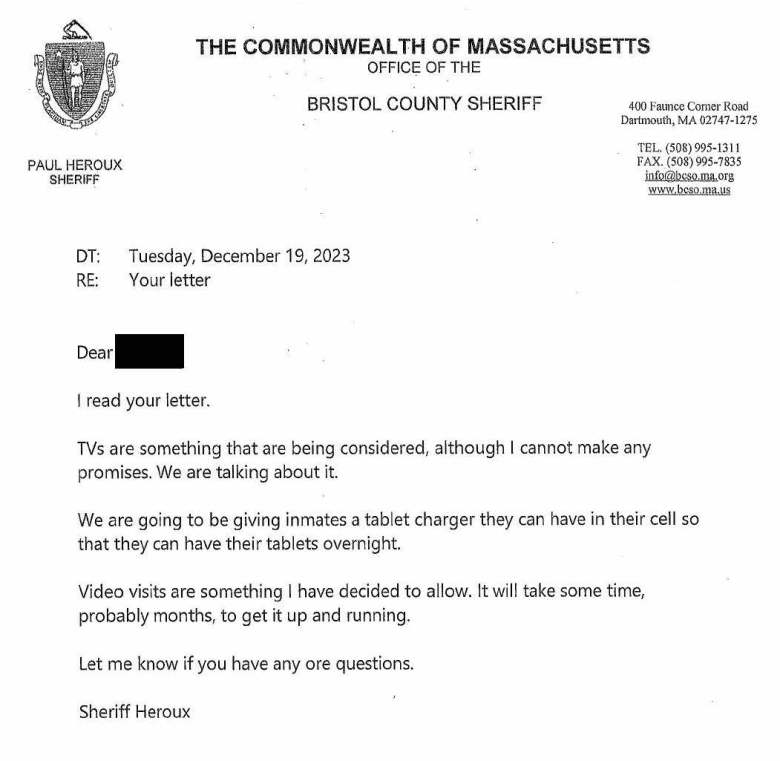
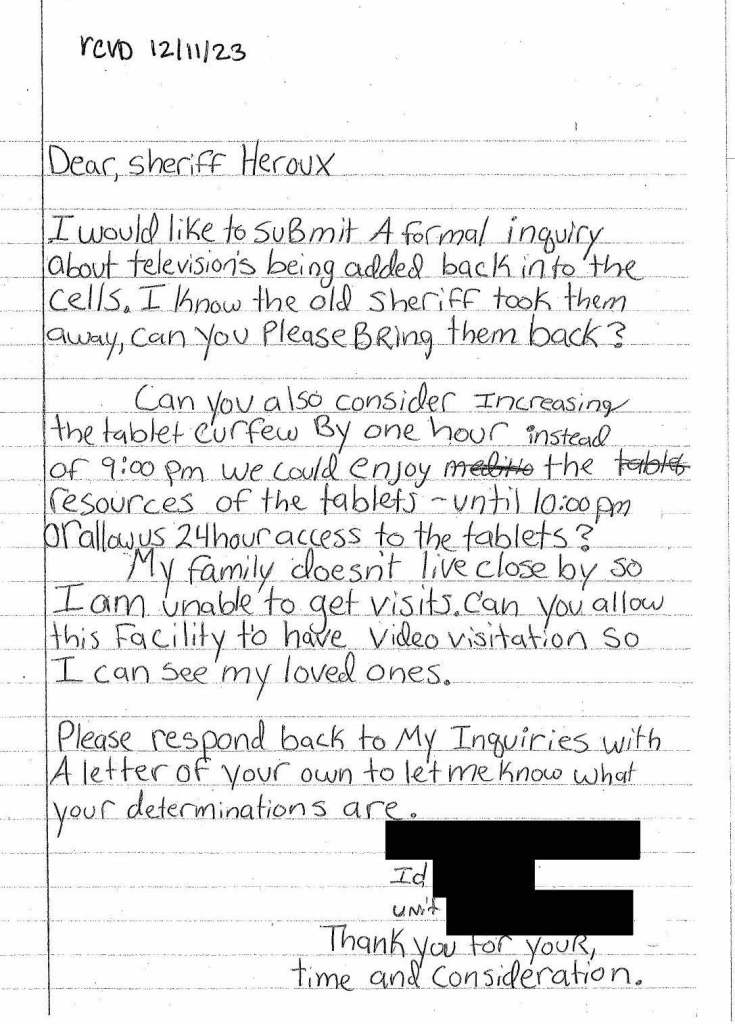
About a week later, Heroux answered. TVs are being considered, he wrote. And a change was coming with the tablets.
“We are going to be giving inmates a table charger they can have in their cell so that they can have their tablets overnight,” he wrote.
“Video visits are something I have decided to allow,” Heroux added. “It will take some time, probably months, to get it up and running.”
In a March 20 email to The Light, Heroux said these changes were in the works, but had not yet been made.
‘You never know what someone is thinking’
What was going on with the shower? In this inmate’s housing unit, it seemed the showers were not working nearly as well as elsewhere.
“Our water barely hits our body,” the inmate wrote in December. “Also we need to push a button every ten to fifteen seconds just so our shower can stay on and unlike every other unit our (unit) does not have any shower curtains, which just might be a ‘Prea’ violation,” he wrote, referring to the federal Prison Rape Elimination Act, a law adopted in 2003. “You never know what someone is thinking walking by and seeing you without clothes in the shower.”
The letter, running just over two pages, touched on other matters: why must inmates wear their jail uniforms — beige for sentenced inmates, dark green for pre-trial detainees — almost all day? Why are certain items being removed from the list of products that inmates can order from the virtual “canteen” of snacks, clothing and personal products? When would a certain housing unit be reopened for sentenced inmates?
Heroux answered a couple weeks later:
“I am working many ‘bricks and mortar’ infrastructure issues. I will let the maintenance director know about your concern. If these are in disrepair, we will add this to the list, but it may be many months before we can actually do it.”
In another letter answering an inmate’s concerns about the showers, privacy and the PREA, Heroux wrote that the showers comply with the federal law. He did not address that issue in his response to this inmate.
The housing unit the inmate mentioned in December will open once there are toilets installed in the cells and locks on the doors, the sheriff wrote. He referred to a multi-million dollar project to make these changes to that unit and 10 others, where the door to the housing unit locks, of course, but not the individual cell doors in the unit.
Canteen items, Heroux wrote, are decided by the vendor, not the administration.
Better news on uniforms: “The policy about when you need to wear uniforms is likely going to change in the future. Stay tuned.”
Contact visits with a girlfriend? A baby?
In his first year, Heroux handled several requests for “contact visits,” meaning inmate and visitor are supervised by a correctional officer, but not separated by a physical barrier such as a glass partition. In a March 20 email, Heroux said physical contact is allowed “on a case by case basis.”
In January this year, an inmate wrote two letters, each in part asking for such a visit with his girlfriend, whom he had not seen in a year, for Valentine’s Day.
In his response on Feb. 2, the sheriff did not say yes or no: “As to contact visits, we are considering them. We’re looking at a bunch of policy changes.”



A year ago, weeks after Heroux took office, an inmate wrote asking for a contact visit with her infant daughter, who she said had spent much of the first months of her life in Boston hospitals, being treated for a congenital condition. Details were stricken for legal reasons.
The baby was awaiting another surgery, the inmate wrote in February 2023, and there was a strong chance she would not survive. The inmate wrote that she knew she had made “mistakes in my life, mistakes that led me to be in this position in the first place,” but the child was innocent. Were she not able to see the child and, perhaps, “say goodbye, is something I would never be able to forgive myself for.”
Heroux responded briefly in April: “Thank you for reaching out. I approved the contact visit with your daughter. I hope it is a nice reunion.”
Email reporter Arthur Hirsch at [email protected].
More stories by Arthur Hirsch

March 6, 2024March 6, 2024
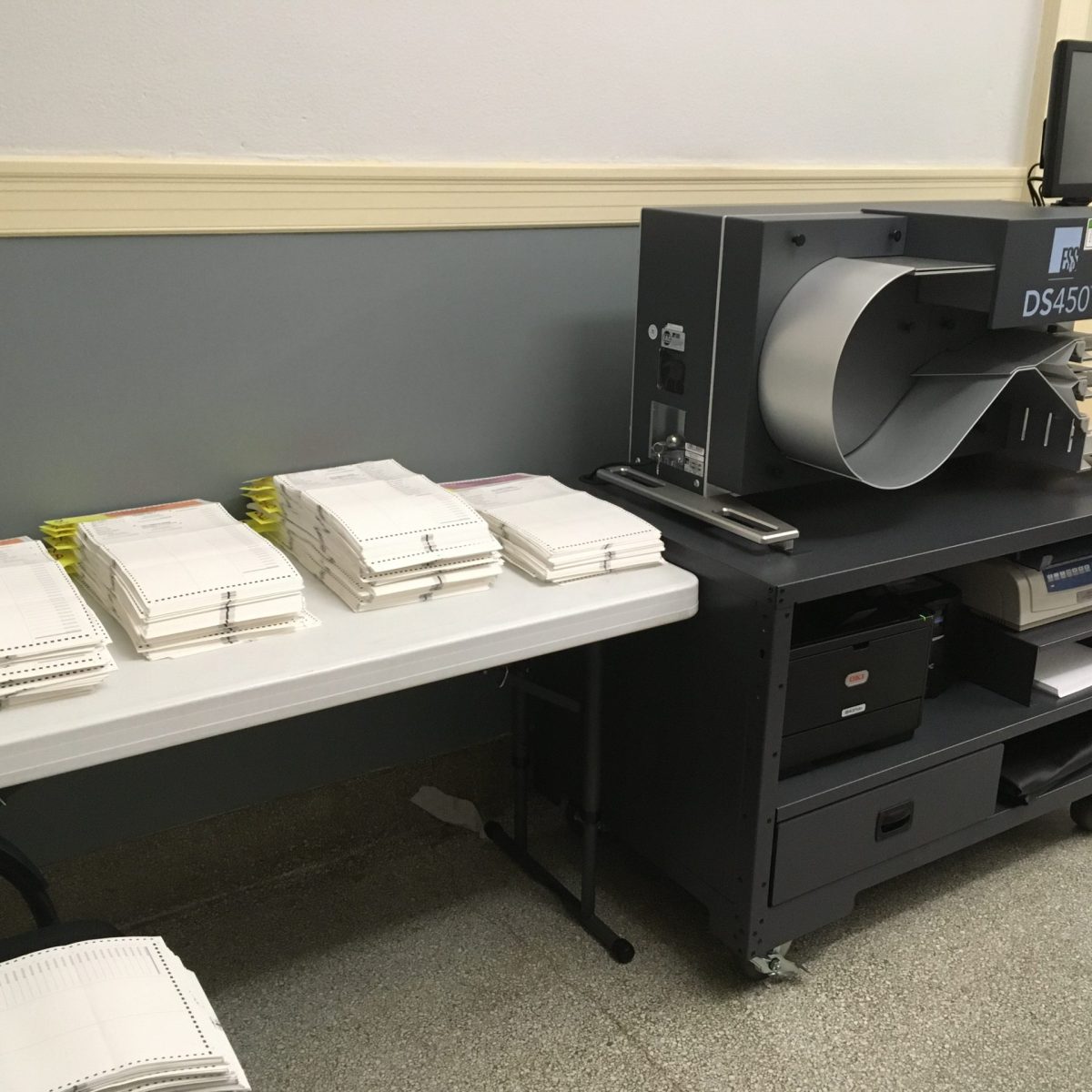
March 4, 2024March 5, 2024

February 22, 2024February 28, 2024



